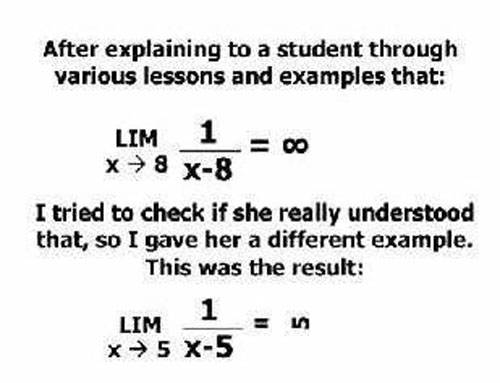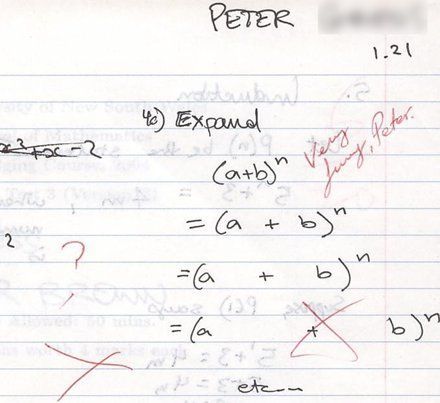|
Quanlei Fang
|
My Teaching Portfolio
Teaching Philosophy
As an old Chinese proverb says: "Teachers open the door, and students enter by themselves.'' I think the essential role of a teacher is to pass on his or her sense of excitement in learning to students, to attract students to walk through the doors of knowledge and to inspire students to learn. Learning is a life-long continuing process by which individuals acquire knowledge and skills at their own pace. I would like to lead my students to think about math in the way that my professors have led me.
Teaching Methods
-
Make the class as interesting as possible
I believe a good teacher must not only have a mastery of the material but also needs to be able to explain it well through clear communication while making the class as interesting as possible. When I teach calculus, I try to bring in real world applications whenever I can. For example, I encourage my students to watch math related TV (such as Numb3rs). I tell them some related humorous stories and challenge them to think about the math problems in these stories. I try to stimulate their thinking by asking questions that happen in real life. For example, before talking about calculating volumes of solids, I ask them to consider how to find the volume of a tire or a ring. Sometimes I also use computers to help students develop understanding and familiarity with basic abstract concepts, notation and jargon. For example, I use the graphics feature of my favorite software Mathematica to illustrate mathematical concepts which are otherwise difficult to understand.
Allow students time to attain basic understanding
Another important point in my approach is that I allow students time in class to work toward fundamental understanding of a new topic. Both in class and in one-to-one contact during office hours, I try to stress the essential elements of mathematics and repeat important ideas. To understand Mathematics at the university level, one must develop the ability to think abstractly and geometrically. Since students have different learning styles, it is helpful to explain the concepts in three ways----verbally, geometrically, and algebraically.
-
Encourage students to get involved
"Tell me and I will forget. Show me and I will remember. Involve me and I will understand." The proverb said it. Students often learn best by getting involved. I believe I should not only teach my students the material, but also, more importantly, how to investigate, think critically, identify interesting problems, and venture forth on their own. Therefore I always encourage my students to ask questions. I often break up the class into working groups. Students are offered real opportunities to actively do mathematics in the group. I also assign extra credit work, such as projects using what we learned in class or additional interesting topics.
-
Learn from the students
I always try to adopt constructive suggestions from students to improve my teaching style and techniques. For me, teaching is really an integral part of learning.
Teaching Experience
Tutor
When I was an undergraduate student at Huazhong Univ.of Sci. & Tech.(HUST) in China, I tutored four high school students in science subjects (math, physics, chemistry) during my first two years in college. When I was a senior I tutored a freshman in calculus.
Teaching Assistant
Since graduate school, I worked as a teaching assistant for a number of undergraduate-level courses at HUST: mathematical analysis, numerical analysis and differential equations. In these courses, my responsibilities included teaching recitation sessions, designing quizzes and tests, grading, and holding office hours.
Classroom Teaching/ e-tech Teaching
When I was in Virginia Tech, I worked as a programmer for our math lab--math emporium for three years. My assignments included debugging the online teaching system and designing online problems for quizzes and tests using Mathematica.
I probably learned the most from teaching calculus classes, where I had full responsibility for the courses. I taught two years' calculus classes at Virginia Tech: Differential Calculus, Integral Calculus and Applied Calculus. After I came to SUNY-Buffalo, I still teach Calculus. My students usually have different backgrounds, some are math majors, some are engineering majors, others are business majors and a few are undecided. Some of the students have already taken a similar course (or many) and believe that they know all of the material. It is challenging to keep these students involved. I try to give interesting problems early, and continue to give more throughout the semester, so that they can see that there are gaps in their knowledge before it is too late.
Here is a summary of my courses and other teaching activities.
I understand that excellence in teaching is a life-long challenge. I enjoy spreading my knowledge and passion to my students. I gain great satisfaction from seeing them learn real mathematics. After all, becoming a good educator is an essential part of my career goal.
Here are some math jokes that I always tell to my students. To see more, you can go to Mathjokes.org and you can also look at my collection of errant errors here.
A constant function and e^x are walking on Broadway. Then suddenly the constant function sees a differential operator approaching and runs away. So e to the x follows him and asks why the hurry. "Well, you see, there's this differential operator coming this way, and when we meet, he'll differentiate me and nothing will be left of me...!" "Ah," says e^x, "he won't bother ME, I'm e to the x!" and he walks on. Of course he meets the differential operator after a short distance.
e^x: "Hi, I'm e^x"
diff.op.: "Hi, I'm d/dy"Teacher: "Who can tell me what 7 times 6 is?"
Student: "It's 42!"
Teacher: "Very good! - And who can tell me what 6 times 7 is?"
Same student: "It's 24!"Q: Why do mathematicians often confuse Christmas and Halloween?
A: Because Oct 31 = Dec 25.


| Home | Research | Teaching | Useful links | Personal |
